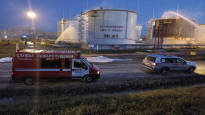A fire broke out at an oil refinery in southern Russia. A fuel depot caught fire near the bridge connecting Crimea and Russia. A freight train derailed in Bryansk near the Ukrainian border. A fuel warehouse caught fire in Sevastopol, Crimea.
The examples tell about the attacks against Russia in recent days. According to Russia, the reason is the drone and bomb attacks, part of which Russia directly blames Ukraine.
– Yes, this indicates that the rounds in the war are getting tougher. The attacks may be related to Ukraine’s expected counter-attack, says Docent of Military Science, Visiting Researcher at the Alexander Institute Ilmari Käihkö.
According to Käihkö, Ukraine’s attacks on Russian territory are not exactly new in the war, as Ukraine made attacks across the border already last year. However, according to him, it is remarkable that after months of backwater phase, we see a cluster of attacks.
– Ukraine is now trying to soften Russia’s defense. Russia, on the other hand, is trying to weaken Ukraine’s ability to attack, says Käihkö.
Russia has also hit Ukrainian cities fiercely. The night before Thursday, Ukraine says it has repelled a series of aircraft attacks in several cities, including Kiev.
– Our cities have not experienced such intense attacks since the beginning of the year, said the head of the military administration in Kyiv Serhi Popko.
According to Ilmari Käihkö, the fierce drone attacks on Ukrainian cities can also be a countermeasure to Wednesday’s alleged drone attacks on the Moscow Kremlin. Russia has blamed Ukraine for them.
The pressure to launch a counter-offensive against Ukraine is intense
Ukraine has long been expected to launch a counter-offensive on the eastern front. The matter was also repeated by Ukrainian President Volodymyr Zelenskyi, who visited Helsinki on Wednesday.
According to Ilmari Käihkö, there are now huge expectations for the counterattack.
– Ukraine is forced to launch a counterattack because the Ukrainians are waiting for it, and because Ukraine’s supporting countries are also waiting for it, says Käihkö.
The pressures are great because the war has lasted longer than many believed.
– It was believed that there would be no more big wars, but now we have already seen 14 months of large-scale war of consumption in Europe.
There are only guesses about the course of the counterattack
Military science experts are guessing when the counterattack could start and how it could proceed.
It has been speculated that it could start already in the next few days, for example, around May 9, Victory Day. The day is celebrated in Russia in honor of the victory over Nazi Germany in the Second World War.
The docent of military science reminds us that it is difficult to say anything precise about the course of the attack.
Maybe we think that Ukraine will concentrate the troops in one place and push through the Russian troops, and thus possibly continue south to the sea, he thinks.
– It may be that the counterattack won’t get off to a good start right away, says Käihkö.
It could take weeks, even months, for Ukraine to get through. It is also possible that the war will continue as it is now.
However, among other things, the US experts who predicted the course of the war well in the past say that Ukraine will advance, that is, liberate its territories.
– I would emphasize all the time that we do not know what will happen here and what is the exact situation of the Ukrainian and Russian forces at the moment, says Käihkö.
What happens after the counterattack?
No one dares to predict the end of the war yet. Few believe that a counterattack would end the war either.
Some war events last year created the belief that Ukraine could win the war. Such was the Ukrainian attack in Kharkiv in September of last year. That’s when Ukraine showed that it is capable of counterattacking and recapturing territories.
The second was Russia’s withdrawal from Kherson in November.
Now the situation is more difficult for Ukraine.
– It is justified to say that in the current situation there is no place in Ukraine where the situation would be as favorable for them as it was in Kharkiv in September and Kherson in November, says Ilmari Käihkö.
